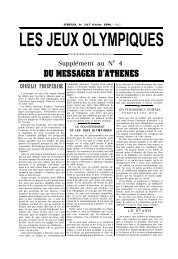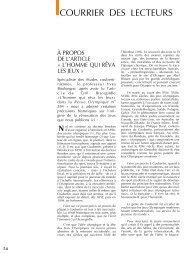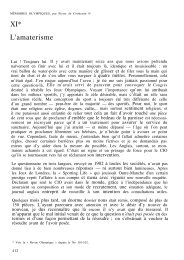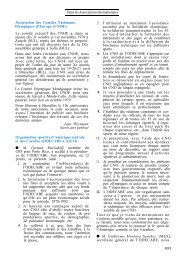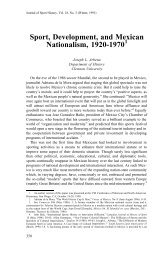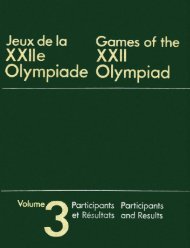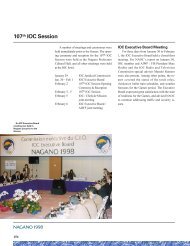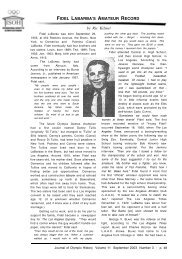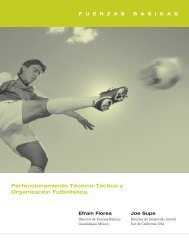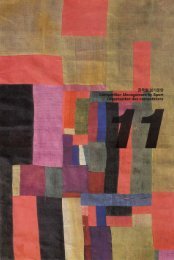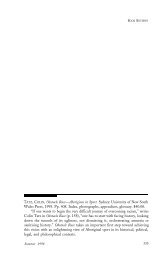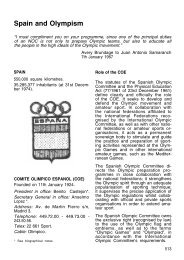Mexico City Olympic Games Official Report ... - LA84 Foundation
Mexico City Olympic Games Official Report ... - LA84 Foundation
Mexico City Olympic Games Official Report ... - LA84 Foundation
Create successful ePaper yourself
Turn your PDF publications into a flip-book with our unique Google optimized e-Paper software.
272<br />
De même que pour les compétitions sportives, chaque pays avait toute<br />
liberté de choisir celles des manifestations auxquelles il désirait par-<br />
ticiper. D'autre part, les modes d'expression culturels échappant à<br />
toute classification objective, aucune médaille n'est venue récompenser<br />
les participants. En effet, comme l'a proclamé M. Gustavo Díaz Ordaz<br />
dans son rapport présidentiel de 1967: "Aucune nation, aucune com-<br />
munauté ne peut se targuer d'être supérieure aux autres en ce qui<br />
concerne les manifestations de la pensée."<br />
Le Comité organisateur présenta son projet d'Olympiade culturelle au<br />
Bureau exécutif du Comité international olympique, lors de l'Assemblée<br />
générale tenue à Téhéran en avril 1967. M. Pedro Ramírez Vázquez ,<br />
après avoir exposé le programme aux délégués, déclara: "Nous pensons<br />
que, de cette manière, les Jeux connaîtront une plus grande diffusion<br />
à travers le monde, et qu'ils présenteront un double intérêt à la fois<br />
pour les athlètes et pour les spectateurs. Ce programme devrait aider<br />
à la réalisation des idéaux du mouvement olympique, idéaux partagés<br />
par l'humanité tout entière: compréhension et respect mutuels, frater-<br />
nité et amitié entre les nations, véritable entente internationale."<br />
L'Assemblée du CIO non seulement approuva à l'unanimité le projet<br />
du Comité organisateur, mais remercia spécialement le Mexique pour<br />
la manière dont il avait su redonner aux Jeux Olympiques leur ancienne<br />
signification culturelle.<br />
En même temps que les formulaires d'inscription pour les Jeux de la<br />
XIX Olympiade, le Comité organisateur remit des invitations pour les<br />
manifestations culturelles aux présidents des Comités nationaux olym-<br />
piques présents, dont soixante-neuf se déclarèrent immédiatement prêts<br />
à collaborer. Par la suite, des membres du Service des Activités artis-<br />
tiques et culturelles du Comité organisateur se rendirent dans divers<br />
pays pour leur présenter l'Olympiade culturelle et solliciter leur par-<br />
ticipation. Vers la fin de l'année 1967, le président du Comité organisa-<br />
teur visita en personne plusieurs capitales où il s'entretint avec les<br />
ministres de la Culture et des personnages officiels. Ces voyages<br />
portèrent leurs fruits puisque 28 autres nations promirent de coopérer,<br />
tandis que plusieurs décidaient d'accroître leur participation.<br />
L'Olympiade culturelle étant décrite en détail dans le Volume IV de ce<br />
Mémoire, nous nous contenterons de présenter ici un bref résumé des<br />
activités et manifestations figurant au programme olympique:<br />
public greater participation in the <strong>Olympic</strong> program and stimulating<br />
greater interest in the <strong>Games</strong>.<br />
As in the sports competition, each country was free to choose the<br />
events in which it wished to participate. No medals would be awarded<br />
and there would be no judging of performing groups, since cultural<br />
expressions seldom lend themselves to objective classification. President<br />
Gustavo Díaz Ordaz aptly expressed this concept in his 1967 State of<br />
the Union Address: "In loftiness of thought, no nation, no one group<br />
of people, can consider itself superior to the rest."<br />
The Organizing Committee's plan for the Cultural Olympiad was presented<br />
before the Executive Board and the General Meeting of the International<br />
<strong>Olympic</strong> Committee in Teheran in April, 1967. Chairman Pedro Ramírez<br />
Vázquez, after explaining the plan to the assembled delegates, con-<br />
cluded: "We feel that in this manner the <strong>Games</strong> will enjoy greater<br />
dissemination throughout the world and will be doubly interesting and<br />
inspiring for both athletes and spectators. This program should serve<br />
as an effective example for attaining many of the ideals supported by<br />
the <strong>Olympic</strong> movement—ideals to which all of mankind aspire—mutual<br />
understanding and respect, brotherhood and friendship between nations,<br />
and genuine international accord." The IOC meeting not only unani-<br />
mously approved the program of the Organizing Committee, but also<br />
gave <strong>Mexico</strong> a special vote of gratitude for expanding the Cultural<br />
Program of the <strong>Olympic</strong> <strong>Games</strong> in such a significant manner.<br />
Along with entry forms for the <strong>Games</strong> of the XIX Olympiad, the Organ-<br />
izing Committee distributed invitations for the Cultural Olympiad to<br />
the heads of the assembled national <strong>Olympic</strong> committees. Of those<br />
present, sixty-nine made immediate affirmative responses. Subsequently,<br />
members of the Organizing Committee's Department of Artistic and<br />
Cultural Activities visited many nations to describe the Cultural Olym-<br />
piad and solicit greater participation. Toward the end of 1967, the<br />
chairman of the Organizing Committee personally visited several world<br />
capitals and conferred with ministers of culture and other officials. As<br />
a result, an additional twenty-eight countries decided to take part in<br />
the Cultural Olympiad and many countries already committed increased<br />
their participation.<br />
While a full report on the Cultural Olympiad is reserved for Volume IV



